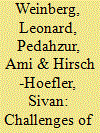| Srl | Item |
| 1 |
ID:
058975


|
|
|
| 2 |
ID:
144885


|
|
|
|
|
| Summary/Abstract |
Does religious identity prompt radical action? This article presents a model of individual-level radical action. Drawing mostly on collective action theory the article posits that organizational membership drives the effect of religious identity on individual-level radical action. Using survey data the article assesses the behavior of Jewish settlers in the West Bank in the face of the 2005 Gaza withdrawal. The article finds that contra the prevailing view, which holds that religious identity alone is sufficient to trigger violence, evidence suggests that organizational membership is a mechanism bridging religious identity and radical action. Longstanding arguments tying radical actions solely to religion may require substantial revision.
|
|
|
|
|
|
|
|
|
|
|
|
|
|
|
|
| 3 |
ID:
178942


|
|
|
|
|
| Summary/Abstract |
A multi-national sample was used to investigate mechanisms that were hypothesized to moderate the relationship between exposure to political violence and symptoms of posttraumatic stress (PTS). We hypothesized that a) the phase of the conflict and b) the status asymmetry of the conflicting parties would moderate the relationship between exposure and PTS symptoms. We used original data from four groups: Israelis and Palestinians (n = 2,572), and Protestants and Catholics in Northern Ireland (n = 343). Looking at these two conflicts, we found that the positive relationship between exposure to violence and posttraumatic stress symptoms ceases to exist in a post-conflict setting (F(1, 2053) = 4.95, p < .05, η2 = 0.002). Interestingly, we found that PTS symptoms were highest among minority group members in an ongoing conflict irrespective of exposure to political violence (F(1, 2053) = 120.74, p < .001,η2 = 0.06). We provide explanations for these findings and discuss their psychological implications for victimized groups and the wider geopolitics of intergroup conflict.
|
|
|
|
|
|
|
|
|
|
|
|
|
|
|
|